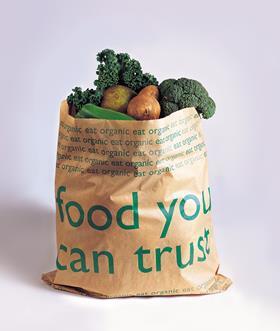
Organics boasting a 40 per cent share of the market in just 10 years’ time? That’s what Eddie Wilkinson, senior category manager at Produce World, the UK’s largest organic veg grower, would like to see.
And organic fruit and veg could spearhead this revolution, with Finn Cottle, trade consultant at the Soil Association, calling them the “hero” products of the category.
While Wilkinson admits that it’s unlikely we’ll get to a point where more organic veg across the whole category is being eaten than non-organic, the organic category – which was shown to account for just 1.3 per cent of the overall food and drink market in February’s Organic Market Report 2015 – is growing at a time when non-organic grocery sales are falling.
Cottle tells FPJ that the buoyancy in the organic market is highlighted by Nielsen data for the year ending March 2015 showing that organic produce sold through the supermarkets now accounts for 2.9 per cent of sales.
However, she notes: “In produce, there are two big issues. Deflation is occurring, and it is unprecedented. Food generally to the end of March was minus one per cent in fresh, and that is having an impact on organic produce, but it’s not hitting organic produce in the same way as it’s hitting produce in general.
“It’s a challenge. There’s so much more competition. Prices are being reduced to retain market share, and that’s happening across all food, and produce is a key area for retailers to reduce price. The price difference between organic and non-organic is getting wider, and price is a big obstacle for consumers.
“On top of that, it’s a rocky time in multiple retail, with retailers looking at cutting SKUs. Crystal ball-gazing, we hope as an industry there will be no culling of organic items. It’s a unique choice on the shelves, and if it isn’t there, there’s no substitute, and that message has to be loud and clear.”
Catherine Fookes, campaign manager at the Organic Trade Board lobbying body, identifies three key purchasing barriers as accounting for organics’ low market share in the UK – cost, availability, and other alternative ‘green’ food options such as Fairtrade, ‘Locally Sourced’, and so on.
On this last point, Fookes says: “These purchases tend to be socially, environmentally and ethically driven – much like the sales of organic produce. These products are clearly signposted, providing clarity and a simple choice for time-pressed shoppers. This method of POS should also be used by retailers for organic foods – ensuring that a differentiator is clear.”
Cottle, who deems fruit and veg to be the “hero category” of organics, as it’s “easier” for consumers to comprehend what organic means on these products – “basically, no spray on them” – is keen to see something similar.
She says: “Perhaps items could be stickered in a certain way. It’s hard in fruit and veg, due to the nature of the display, whereas you get these beautiful tea brands that really communicate what organic is on their packs. Fruit and veg is restricted by product size, and packaging type, and so we have to be clever in getting across a consistent message.” Wilkinson concurs: “Consumers see all fresh produce as healthy; so the challenge is convincing people that organic is worth the extra cost,” he says. “This is particularly difficult given the constraints around communications on organics.” The Soil Association met with key stakeholders on Wednesday (6 May), looking at what can be done on the labeling front, with Cottle suggesting that something could potentially come out of this in time for Organic September.
The challenges to boosting the category’s market share aren’t dissimilar to the challenges facing those involved in conventional fruit and veg: “It’s about finding ways to strip cost out to deliver better value to customers and finding ways to deliver a consistent-quality crop as often as possible,” Wilkinson says.
Fookes says the Organic Trade Board would like to see support from the incoming UK government in four specific areas: “The new Common Agricultural Policy must give British organic farmers a fair economic deal, with similar payments for the social and environmental benefits of organic farming as the majority of organic farmers in the rest of the EU. If organic farmers here are not given parity with the rest of the EU, our organic farmers will lose out.
“The new government should actively support the industry’s promotion programmes, with 50 per cent funded by the EU, and 50 per cent funded by industry. The current campaign run by the OTB is a great example of how industry can grow the market, but greater government support would be extremely helpful.
“At least 25 per cent of public funding for agricultural research should focus on improving organic systems, as organic farming pioneers and tests-integrated approaches are crucial to the future of all of farming. And creating a new organic action plan committing to the above so that it is joined up would also be helpful.”
Cottle, meanwhile, has more modest growth aspirations for the category, and notes one inconsistency that eats away at her: “When I look at the market share, I think, why does veg have a 3.7 per cent of the market, but fruit has just 2.3 per cent?
“That just makes me think there’s headroom for fruit there,” she says. “Milk is over five per cent, though, so surely there’s opportunity to get there on fruit and veg, and that should be the target for the next five years.”
She adds: “In the US, organic has a 12 per cent share of the market, with fruit and veg accounting for five per cent of that. It’d be great to reach those figures in five to 10 years, but it’ll take collaborative action to get there.”






No comments yet